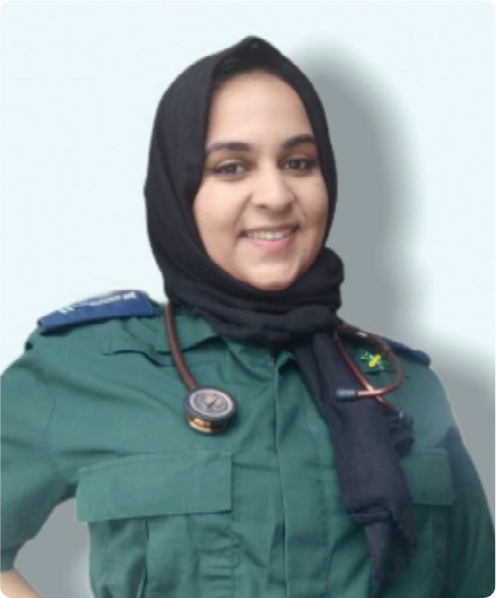
Growing up, I never considered being a paramedic as none looked like me or shared my faith and I felt like I couldn't relate. But when I was applying to medicine and compared my personal statement to the description of paramedicine, it seemed almost word for word. ‘Emergency medicine’ with a ‘hands-on approach’ won me over and I took the plunge without any of my family or friends knowing. Fast forward a few months, I secured an interview and after some further research, my heart was set on it.
Once we all came to terms with my last-minute 360° decision to become a paramedic, I began the first moments of my future vocation and I knew this path was right for me. While as an 18-year-old, it was more than terrifying to be seen as a figure of trust in a time of need when out on placement, I loved the thrill and constant application of knowledge. I was introduced to the ever-growing scope of prehospital care in the ambulance service and from then on, I made paramedicine my passion.
My first year was more of an introduction and acclimatising into the hopeful future. However, in my second year, I started to find more of my niche. I became part of the High Achiever's Recognition Scheme within my University where I gained additional mentoring and training into finding methods of improvement within myself—work which I still participate in as an alumnus. This year was the busiest but it was pivotal in paving my foundations and shaping my goals in my third year. I became more confident in my abilities as a student paramedic, leading cases and having little help or support from my mentor or crewmates however still relying on them to justify many decisions.
By my final year, I enjoyed exploring the different routes I could take as a paramedic. The minor injuries and illnesses module helped me see the profession in a different light and I began to not only independently manage patients, but also start evaluating the wider perspective of an illness. Initially, I focused on what was immediately needed for the patient and getting it done as swiftly as possible. However, at this stage, I began to evaluate the interventions they would receive in hospital, how it would affect their other conditions and quality of life and what steps I could do to reduce the impact. This was helped by my elective placement to New Zealand where I was presented with multiple differences in treatment to what I was used to in England.
All these experiences and methods of growth became key points for me to start building on when I qualified. Working in unfamiliar environments and being exposed to alternative treatment pathways made me more confident working in new areas and taking on the multiple roles I fulfil now from primary care to frontline. The additional training and mentoring I received during my studies gave me the drive to become a vocal changemaker in the future of the ambulance service. While my journey has flown past, I still vividly remember my first day as ‘clinical lead’ in the ambulance, the pressure I felt and the many times I have had to admit that I don't know all the answers, relying instead on someone with many years of experience. The journey seems long, tiring and tedious with so many obstacles and pressures—however, continuous learning and self-development are the motivating aspects that keep me carrying on.

